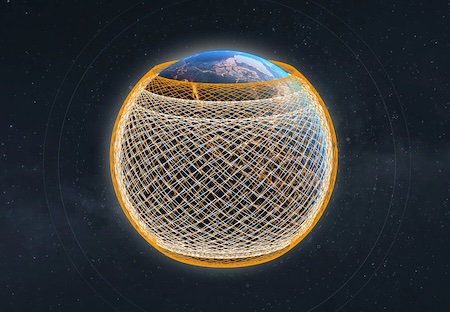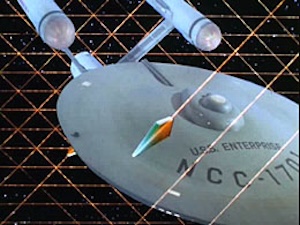Science Fiction
Dictionary
A B C D E F G H I J K L M N O P Q R S T U V W X Y Z
Project Kuiper Satellite Mesh Network

Amazon is getting serious about it's satellite internet system.

(Kuiper internet satellites will form a mesh network)
Amazon has just announced that two of its prototype internet satellites equipped with infrared lasers transferred data at 100 gigabits per second over a distance of nearly 1000 kilometers. The company says all of its upcoming 3236 Project Kuiper satellites will include such interlinks, forming a high-speed mesh network to route data around the world.SpaceXís rival Starlink system, which already boasts over 1.5 million customers including the Ukrainian military, has been experimenting with optical interlinks for about a year. It recently claimed to have more than 8,000 space lasers on its newest generation of satellites, which began launching earlier this year.
Now the race is on to build the first complete optical inter-satellite link (OISL) constellation, at a price thatís competitive with terrestrial 5G and fiber networks. <> (Via IEEE Spectrum.)
In The Tholian Web, an episode from the third season of Star Trek first broadcast in 1968, featured an "energy web" that effectively imprisoned the Enterprise.

(ST:TOS The Tholian Web energy beams)
Although obviously different in purpose, the visual similarity of these images strikes me. I wonder if any of the engineers working on the Kuiper Project saw this episode, and perhaps visualized a satellite network using satellite-to-satellite lasers.
Here's a preview:
Scroll down for more stories in the same category. (Story submitted 12/23/2023)
Follow this kind of news @Technovelgy.| Email | RSS | Blog It | Stumble | del.icio.us | Digg | Reddit |
Would
you like to contribute a story tip?
It's easy:
Get the URL of the story, and the related sf author, and add
it here.
Comment/Join discussion ( 0 )
Related News Stories - (" Space Tech ")
The New Habitable Zones Include Asimov's Ribbon Worlds
'...there's a narrow belt where the climate is moderate.' - Harl Vincent, 1931.
Will Space Stations Have Large Interior Spaces Again?
'They filed clumsily into the battleroom, like children in a swimming pool for the first time, clinging to the handholds along the side.' - Orson Scott Card, 1985.
Reflect Orbital Offers 'Sunlight on Demand' And Light Pollution
'I don't have to tell you about the seven two-mile-diameter orbital mirrors...'
Chrysalis Generation Ship to Alpha Centauri
'This was their world, their planet ó
this swift-traveling, yet seemingly moveless vessel.' - Nat Schachner, 1934
Technovelgy (that's tech-novel-gee!) is devoted to the creative science inventions and ideas of sf authors. Look for the Invention Category that interests you, the Glossary, the Invention Timeline, or see what's New.
Science Fiction
Timeline
1600-1899
1900-1939
1940's 1950's
1960's 1970's
1980's 1990's
2000's 2010's
Current News
The New Habitable Zones Include Asimov's Ribbon Worlds
'...there's a narrow belt where the climate is moderate.'
Can One Robot Do Many Tasks?
'... with the Master-operator all you have to do is push one! A remarkable achievement!'
Atlas Robot Makes Uncomfortable Movements
'Not like me. A T-1000, advanced prototype. A mimetic poly-alloy. Liquid metal.'
Boring Company Drills Asimov's Single Vehicle Tunnels
'It was riddled with holes that were the mouths of tunnels.'
Humanoid Robots Tickle The Ivories
'The massive feet working the pedals, arms and hands flashing and glinting...'
A Remarkable Coincidence
'There is a philosophical problem of some difficulty here...'
Cortex 1 - Today A Warehouse, Tomorrow A Calculator Planet
'There were cubic miles of it, and it glistened like a silvery Christmas tree...'
Perching Ambush Drones
'On the chest of drawers something was perched.'
Leader-Follower Autonomous Vehicle Technology
'Jason had been guiding the caravan of cars as usual...'
Golf Ball Test Robot Wears Them Out
"The robot solemnly hit a ball against the wall, picked it up and teed it, hit it again, over and again...'
Boring Company Vegas Loop Like Asimov Said
'There was a wall ahead... It was riddled with holes that were the mouths of tunnels.'
Rigid Metallic Clothing From Science Fiction To You
'...support the interior human structure against Jupiterís pull.'
Is The Seattle Ultrasonics C-200 A Heinlein Vibroblade?
'It ain't a vibroblade. It's steel. Messy.'
Roborock Saros Z70 Is A Robot Vacuum With An Arm
'Anything larger than a BB shot it picked up and placed in a tray...'
A Beautiful Visualization Of Compact Food
'The German chemists have discovered how to supply the needed elements in compact, undiluted form...'
Bone-Building Drug Evenity Approved
'Compounds devised by the biochemists for the rapid building of bone...'
